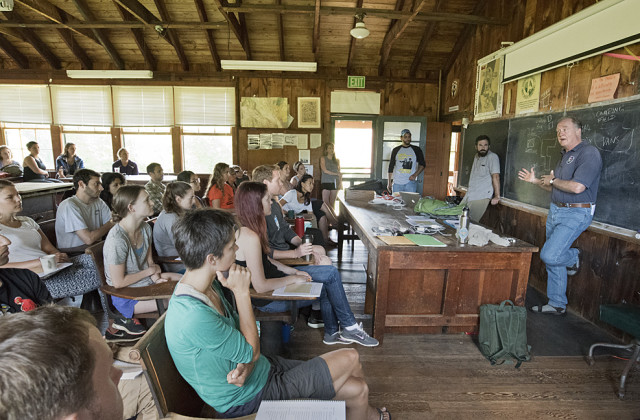Students at the Yale School of Forestry and Environmental Studies Get Their Start in the GMF Woods
Summer Camp With a Purpose
By David Beers
For three weeks every summer, the Yale Summer School of Art and Music is not the only university program in town. Few are aware that every August about 160 Yale forestry students are also in Norfolk, learning while tromping through Great Mountain Forest (GMF).
These students are from the Yale School of Forestry and Environmental Studies (FES), which awards masters and doctoral degrees in a variety of environmental disciplines. FES was founded in 1900 as the first forestry graduate program in the United States.

The dining room at Yale Camp in Great Mountain Forest.
Before beginning their studies in earnest in September, all new students at FES must complete three weeks of outdoor forestry studies. This program is affectionately known as MODS, short for Technical Skills Modules. The students rotate through three different locations and curricula each week. Yale mixes up the groups of students at each location so that they get to know as many of their new classmates as possible. Most of the students are in their 20s, although FES encourages applications from older students with work experience; about a third of them are from other countries.
One week is spent at the Yale-Myers forest camp in northeastern Connecticut. At this 7,800-acre working forest, students learn about forest management and how to sample and measure all aspects of the forest. Students spend another week biking around New Haven, learning how to identify trees, shrubs, invasive plants—and each other—and being introduced to urban environmental issues. And then there is the week spent at Yale Camp in the 6,000-acre GMF forest. Here students acquire knowledge of maps, orienteering, surveying and land-use history.
GMF has a long history of cooperation with Yale. It was two Yale alumni, Frederic Walcott and Starling Childs, who originally purchased the land at GMF. Childs’s son Ted and his grandson Star were also FES alumni (class of 1932 and 1980, respectively). In 1938, the notoriously destructive New England Hurricane thwarted plans to set up a summer forestry program at the Yale-Myers forest. In response to this misfortune, the Childs family offered to host the training program at GMF. In 1940, Ted Childs constructed the camp buildings and donated them, along with seven acres in the heart of GMF, to Yale to serve as a training ground. Over the decades, the Yale forestry camp has evolved to become the MODS program of today.
Star Childs has been the lead instructor for the GMF MODS program since 1990. He is joined by three other Yale instructors and six teaching assistants, who were themselves MODS students a year or two ago. According to Childs, “This is the first chance the new students get to know each other, learn the importance of teamwork and bond with each other. Many friendships that last a lifetime start with this week at GMF.”

The lounge at Yale Camp has many mementoes of past years.
The main building has a large airy classroom, a common room with big fireplace, a dining room, a certified commercial kitchen and bunk beds upstairs and downstairs. There is also a cluster of basic cabins and a central washhouse. At night, students gather around a big fire pit to observe the starry sky. Some students pitch their own tents in a field for the week, and others sleep in the cabins in sleeping bags. Electricity and water are used sparingly, because the facility is powered by solar panels, deep-cycle battery storage and a backup generator. The students take turns helping to prep and clean up after meals.
For their fieldwork, the students are split into eight teams of seven to eight individuals, plus a teaching assistant. Days start with some classroom instruction, and the afternoons are filled with using to use a compass, pace counting, GPS, air photos and maps to traverse the forest. At first, the teams must learn to navigate without the benefit of GPS. Later in the week, teams use GPS and tablet computers to record what they find on long-distance transects. The evenings are free for swimming, softball games, campfires and singing. The week wraps up with each team presenting what they have learned about the landscape during their travels through the woods—trees, land-use history, geology, hydrology, ecology and so on.
Teaching assistant Anna Fiastro was upbeat and excited about her upcoming week with the students. It was her second summer as a teaching assistant for the program at GMF. She specifically sought out a teaching position there because it was her favorite week of MODS as an incoming student.
Student Jessica Wikle sums up her week at MODS by saying, “Great Mountain Forest is a beautiful setting to come together and meet new people, and I had a great time getting to know my classmates while walking around in the woods.” She added, “
The most important thing MODS does is to create a community of learners where none existed before. It is the perfect way for students to start their time at FES together.
Photos by Bruce Frisch. Top: As part of this summer’s MODS program at the Yale Camp, Star Childs tells the new forestry students about the history of Great Mountain Forest.

